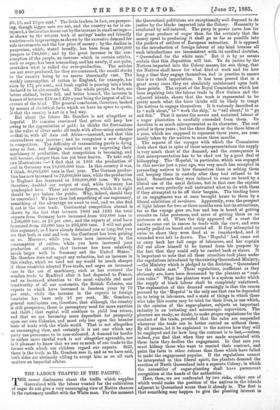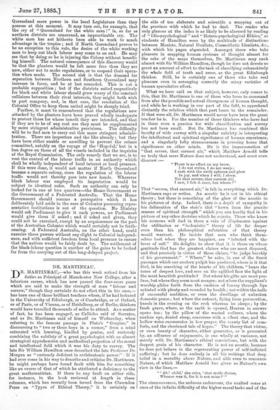THE LABOUR TRAFFIC IN THE PACIFIC.
THE recent disclosures about the traffic which supplies Queensland with the labour wanted for the cultivation of sugar do not give a very encouraging view of Native chances in the customary conflict with the White man. For the moment the Queensland politicians are exceptionally well disposed to do justice by the blacks imported into the Colony. Humanity is reinforced by self-interest. The party in power cares less for the gross produce of sugar than for the certainty that the money spent in producing it shall go as far as possible into the pockets of settlers of European extraction. It is opposed to the introduction of foreign labour of any kind because all such introductions are inconsistent with its cardinal doctrine, "Queensland for the white man." But it is by no means certain that this disposition will last. To do justice by the Natives imported into the Colony means, for one thing, that the Natives shall know for what kind of work and for bow long a time they engage themselves, and in practice to ensure this is to check importation. It has been proved that in a great many cases they are absolutely uninformed upon both these points. The report of the Royal Commission which has been inquiring into the labour trade in New Guinea and the adjacent islands, shows that the work is represented to be pretty much what the hirer thinks will be likely to tempt the natives to engage themselves. It is variously described as to "walk about," to "work the ship," to "sail about," to "go and fish." That it means the severe and sustained labour of a sugar plantation is carefully concealed from them. Its duration is as much misrepresented as its character. The real period is three years ; but the three fingers or the three bites of a yam, which are supposed to represent three years, are commonly taken by the natives to mean three months.
The reports of the voyages with which the Commission deals show that in spite of these misrepresentations the supply is very much short of the demand, and the consequence is that misrepresentation has to be eked out by a good deal of kidnapping. The € Hopeful,' in particular, which was engaged in this service just a year ago, was very much less occupied in persuading natives to hire themselves than in seizing them and keeping them in custody after they had refused to be hired. Sometimes they were induced to come on board by a liberal use of the usual fictions, but in that case the captain and crew were perfectly well instructed what to do with them if they attempted to be off their bargain. The binding force of an engagement was at once brought home to them by a liberal exhibition of revolvers. Apparently, even the prospect of light labour for two or three months soon lost its attractions, for as the voyage goes on, less and less is heard of getting recruits on false pretences and more of getting them on no pretences at all. When ;he ship appeared off a coast the natives came out in canoes to trade with the crew, and were usually pulled on board and carried off. If they attempted to swim to shore they were fired at or tomahawked, and if wounded were left to drown. The ' Hopeful ' had come out to carry back her full cargo of labourers, and her captain did not allow himself to be turned from his purpose by the fact that they could only be carried back as slaves. It is important to note that all these atrocities took place under the regulations introduced by the existing Queensland Ministry, —the Ministry which is pledged to the doctrine, "Queensland for the white man." These regulations, inefficient as they obviously are, have been denounced by the planters as "castiron rules." What the planters want is a system under which the supply of black labour shall be completely unfettered. The explanation of this demand seemingly is that the course pursued by the ' Hopeful ' is the only one that can be depended on to bring in labourers, and a state of things in which those who take this course may be tried for their lives, is one which, in the opinion of the sugar-planter, subjects an important industry to an irritating and microscopic supervision. The planters are ready, no doubt, to make proper regulations for the conduct of the trade, provided that the rules are suspended whenever the trade can be better carried on without them. By all means, let it be explained to the natives bow they will be employed and for how long the contract is to last,—unless, indeed, you find that when they are made acquainted with these facts they decline the engagement. In that case you must kidnap those who want to rescind their contract, and paint the facts in other colours than those which have failed to make the engagement popular. If the regulations cannot be interpreted in• this liberal spirit, the planters demand the erection of Nbrth Queensland into a separate Colony, in which the necessities of sugar-planting shall have paramount recognition at the hands of the authorities.
Here, then, we are confronted by two risks, either one of which would make the position of the natives in the islands adjacent to Queensland worse than it already is. The first is that something may happen to give the planting interest in Queensland more power in the local Legislature than they possess at this moment. It may turn out, for example, that the cry of "Queensland for the white man!" is, so far as northern districts are concerned, an impracticable cry. The white man has not hitherto been able to work to much advantage in the tropics ; and if North Queensland proves to be no exception to this rule, the desire of the white working men to keep out black labour may come to an end. He may see that by doing so he is injuring the Colony without benefiting himself. The natural consequence of this discovery would be that the planters would be left more free than they are now, either not to make regulations, or to suspend their operation when made. The second risk is that the demand for separation between Northern and Southern Queensland may increase in force, and be at last conceded. This is rot a probable supposition ; but if the districts suited respectively for black and white labour should grow weary of the constant collisions between their rival interests, they might both wish to part company, and, in that case, the resolution of the Colonial Office to keep them united might be sharply tried. Further, it must be remembered that the regulations now attacked by the planters have been proved wholly inadequate to protect those for whose benefit they are intended, and that if they are to be of any real use they must be supplemented by more stringent administrative provisions. The difficulty will be to find men to carry out this more stringent administration. There are inspectors and the like already ; but they have been either unable or unwilling to prevent the crimes committed, notably on the voyage of the Hopeful,' but in a less degree on those of all the vessels included in the inquiries of the Royal Commission. The only remedy that we see, is to vest the control of the labour traffic in an authority which shall be wholly independenfr of local interest or local pressure. If this were done, it would not matter if North Queensland became a separate colony, since the regulation of the labour traffic would not thereby pass into new hands. Wherever black labour was employed its importation would be subject to identical rules. Such an authority can only be looked for in one of two quarters—the Home Government or the Government of a Federated Australia. That the Home Government should resume a prerogative which it has deliberately laid aside in the case of Colonies possessing representative institutions is out of the question. No Ministry would ask Parliament to give it such powers, no Parliament would give them if asked ; and if asked and given, they could not be exercised, except by an acquiescence on the part of the Australian Colonies which would certainly not be forthcoming. A Federated Australia, on the other hand, could exercise these powers without any slight to Colonial independence, and with sufficient freedom from local pressure to ensure that the natives would be fairly dealt by. The settlement of the black-labour question is another of the gains to be looked for from the carrying out of this long-delayed project.



































 Previous page
Previous page